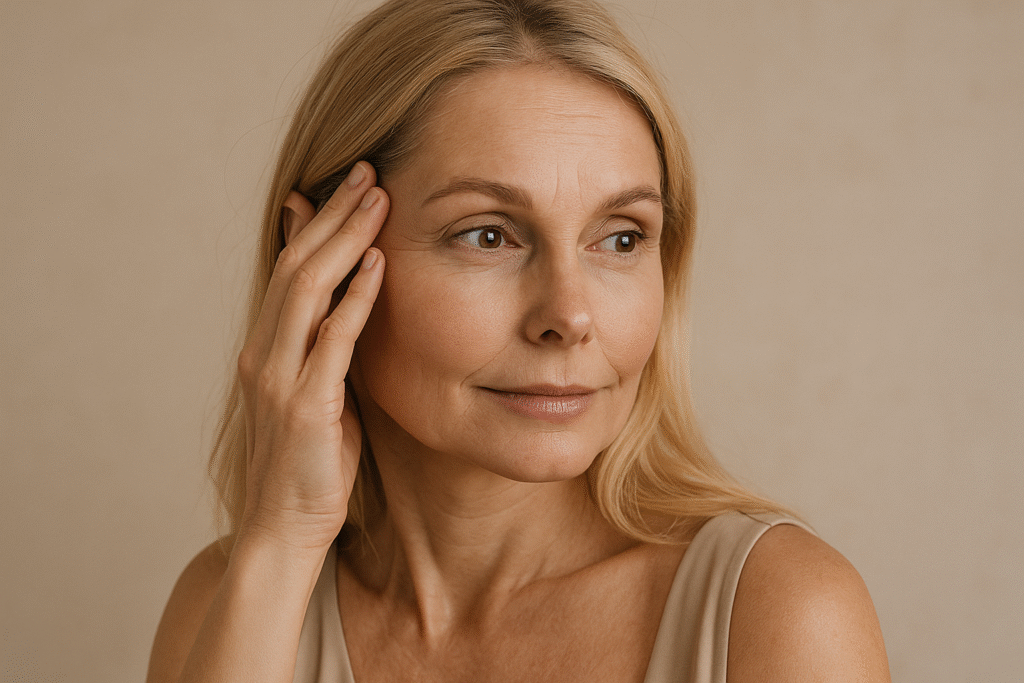When the balance tips - how hormones affect your complexion
When it comes to skin ageing, many people think of UV radiation or skincare mistakes - but an often underestimated factor is our skin. Hormones. They influence skin moisture, elasticity, collagen production and even sebum production. From the age of 30 at the latest, the hormone balance slowly begins to change - with visible effects. In this article you will find out how Hormones Skin ageing to control which phases are particularly critical and how you can counteract hormonal skin changes.
1. 🧬 Which hormones are relevant for skin ageing?
Oestrogen
Promotes collagen formation, skin moisture and blood circulation. A deficiency leads to dry, thin skin and wrinkles - especially during the menopause.
Progesterone
Has a regulating effect on the water balance and sebum production. Fluctuations can cause impurities or feelings of tightness.
Testosterone
Also occurs in small amounts in women. If it increases (e.g. due to hormonal imbalances), it can lead to acne, enlarged pores or increased oil production.
Cortisol (stress hormone)
Chronically elevated cortisol weakens the skin barrier, promotes inflammation and causes the skin to age more quickly.
2. 🕒 When do hormones play a special role?
Puberty
Hormone explosion → oily skin, acne, blemishes.
Pregnancy
Increased oestrogen production → often radiant skin, but also pigmentation disorders (melasma).
From 30
Oestrogen levels begin to fall slightly. Initial dryness, less elasticity, tired complexion.
Menopause
Massive oestrogen loss → loss of moisture, wrinkles, thinner skin, loss of elasticity.
3. 👩⚕️ How you can minimise hormone-induced skin ageing
Hormone-friendly nutrition
- Lots of phytoestrogens (e.g. in linseed, soya, pulses)
- Antioxidants from berries, green tea, dark leafy vegetables
- Healthy fats (e.g. omega-3 from linseed oil or walnuts)
✅ Stress reduction
Yoga, breathing exercises, sufficient sleep - everything that lowers cortisol supports your skin.
✅ Adapt skin care
Use the following active ingredients:
- Hyaluron for moisture
- Niacinamide for barrier & structure
- Retinol/Bakuchiol for cell regeneration
- Peptides to stimulate collagen synthesis
✅ Specialist advice
Hormone therapy (e.g. bioidentical hormones) can help in certain cases - but always with medical supervision!
4. 🌿 Natural cosmetics for hormonal skin
Plant extracts such as:
- Yam root (Dioscorea) → Contains natural phytohormones
- Pomegranate → Antioxidant, skin tightening
- Black cohosh → Hormone-regulating during the menopause
can offer gentle alternatives for hormonal imbalances - especially for sensitive skin.
Conclusion: Hormones control more than you think
Whether smooth, plump skin or sagging, dry patches - behind many changes are Hormones. Who understands how Hormones Skin ageing can take targeted countermeasures. With the right care, diet and a mindful lifestyle, your skin will stay healthy and youthful for longer - without any radical measures.
